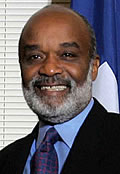Montresor Political Platform
< Previous | Home | Next >
Ancient Diagram of the Holy Trinity
The three Persons are the same in substance, i.e., in essence or in their essential nature, but distinct in subsistence which describes God's mode or quality of existence in three Persons.
By mode of existence we do not mean one God acting in three different ways, but one Divine Being existing in three distinct Persons within one Divine Substance or Essence.
Again, this is not exactly three individuals as we think of three personal individuals, but one Divine Being who acts and thinks as one within a three-fold personality.
This is incomprehensible to our finite and limited minds, but it is the teaching of the Scripture.
"In the Being of God there are not three individuals, but only three personal self distinctions within the one Divine Essence."15
Recognizable and Important Distinctions
The New Bible Dictionary has an excellent summary of this point:
In the relationship between the Persons there are recognizable distinctions.
a. Unity in diversity
In most formularies the doctrine is stated by saying that God is One in his essential being, but that in his being there are three Persons, yet so as not to form separate and distinct individuals.
They are three modes or forms in which the divine essence exists.
'Person' is, however, an imperfect expression of the truth inasmuch as the term denotes to us a separate rational and moral individual.
But in the being of God there are not three individuals, but three personal self-distinctions within the one divine essence [italics mine].
Then again, personality in man implies independence of will, actions and feelings leading to behavior peculiar to the person.
This cannot be thought of in connection with the Trinity.
Each Person is self-conscious and self-directing, yet never acting independently or in opposition.
When we say that God is a Unity we mean that, though God is in himself a threefold centre of life, his life is not split into three.
He is one in essence, in personality and in will. When we say that God is a Trinity in Unity, we mean that there is a unity in diversity, and that the diversity manifests itself in Persons, in characteristics and in operations.
b. Equality in dignity
There is perfect equality in nature, honour and dignity between the Persons.
Fatherhood belongs to the very essence of the first Person and it was so from all eternity.
It is a personal property of God 'from whom every family in heaven and on earth is named' (Eph. 3:15).
The Son is called the 'only begotten' perhaps to suggest uniqueness rather than derivation.
Christ always claimed for himself a unique relationship to God as Father, and the Jews who listened to him apparently had no illusions about his claims.
Indeed they sought to kill him because he 'called God his own Father, making himself equal with God' (Jn. 5:18).
The Spirit is revealed as the One who alone knows the depths of God's nature: 'For the Spirit searches everything, even the depths of God ...
No one comprehends the thoughts of God except the Spirit of God' (1 Cor. 2:10f.).
This is saying that the Spirit is 'just God himself in the innermost essence of his being.'
This puts the seal of NT teaching upon the doctrine of the equality of the three Persons.
c. Diversity in operation
In the functions ascribed to each of the Persons in the Godhead, especially in man's redemption, it is clear that a certain degree of subordination is involved (in relation, though not in nature); the Father first, the Son second, the Spirit third.
The Father works through the Son by the Spirit.
Thus Christ can say: 'My Father is greater than I.' As the Son is sent by the Father, so the Spirit is sent by the Son. As it was the Son's office to reveal the Father, so it is the Spirit's office to reveal the Son, as Christ testified: 'He will glorify me, for he will take what is mine and declare it to you' (Jn. 16:14).
It has to be recognized that the doctrine arose as the spontaneous expression of the Christian experience.
The early Christians knew themselves to be reconciled to God the Father, and that the reconciliation was secured for them by the atoning work of the Son, and that it was mediated to them as an experience by the Holy Spirit.
Thus the Trinity was to them a fact before it became a doctrine, but in order to preserve it in the credal faith of the church the doctrine had to be formulated.16
Boulou, October 29 2009, 2:41 PM
Start a NEW topic or,
Jump to
previous | Next Topic >
< Previous | Home | Next >
< Previous | Home | Next >

 Rene Preval and Congressman Hank Johnson
Rene Preval and Congressman Hank Johnson  Rene Preval and Hugo Chavez
Rene Preval and Hugo Chavez  Rene Preval and Jean-Louis Debre
Rene Preval and Jean-Louis Debre  Rene Preval and Josette Sheeran
Rene Preval and Josette Sheeran  Rene Preval in Canada
Rene Preval in Canada  Rene Preval and Dominique de Villepin
Rene Preval and Dominique de Villepin  Rene Preval and Fidel Castro
Rene Preval and Fidel Castro  Rene Preval and Georges W. Bush
Rene Preval and Georges W. Bush  Rene Preval Making a speech
Rene Preval Making a speech  President Rene Preval
President Rene Preval  New Haitian President Rene Preval Visit to United States
New Haitian President Rene Preval Visit to United States  Trinidad Obama Dissed Preval Nouvelle Tournure New Twist
Trinidad Obama Dissed Preval Nouvelle Tournure New Twist  President Rene Preval speaks to Al Jazeera about the reconstruction of...
President Rene Preval speaks to Al Jazeera about the reconstruction of...  Bringthepai Preval Kout Soulye
Bringthepai Preval Kout Soulye  Obama Dissed Preval In Trinidad Preval Pawol Tafia
Obama Dissed Preval In Trinidad Preval Pawol Tafia 

